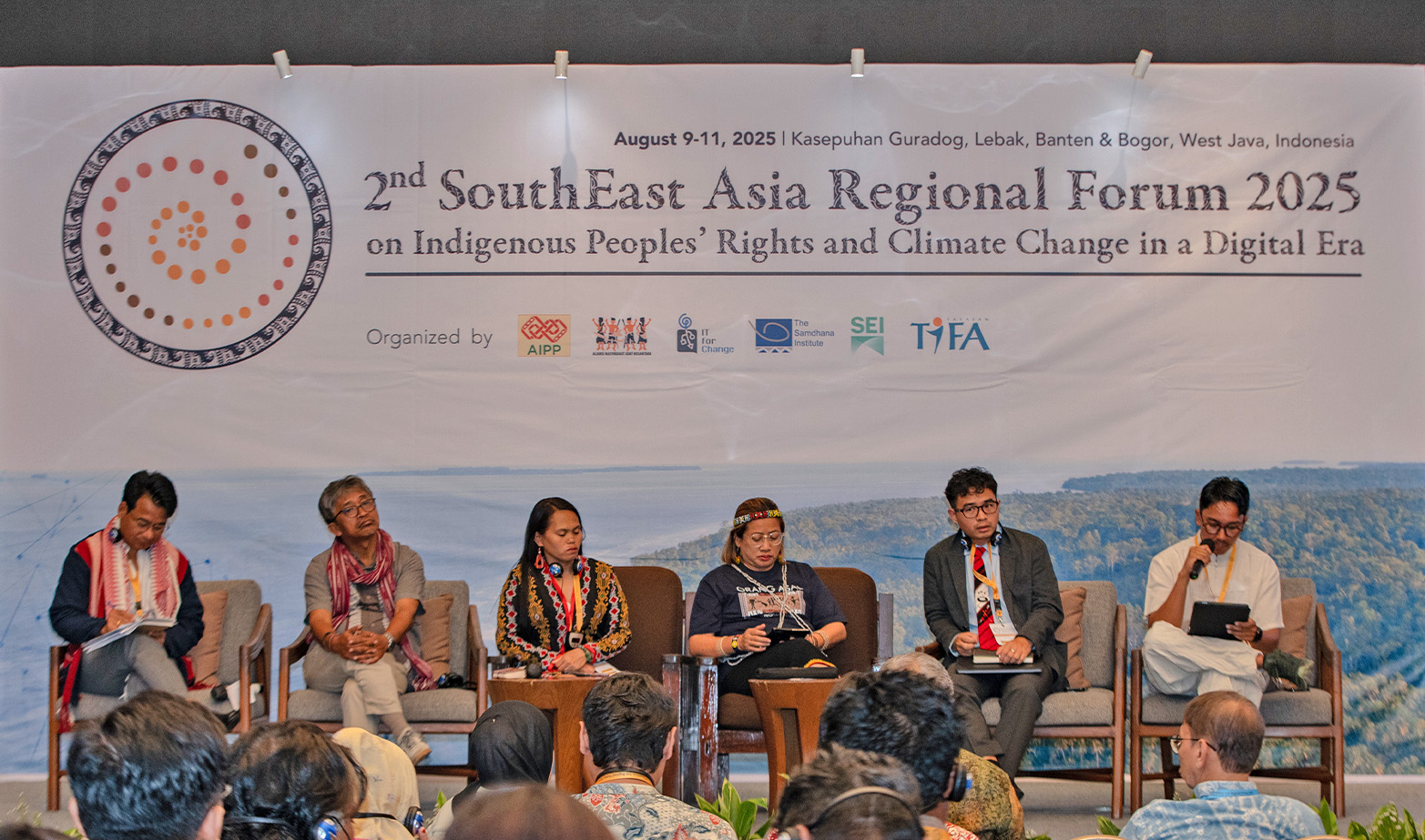
Dr. Wengky Ariando giving his presentation to Plenary Session 1 of the 2nd SouthEast Asia Regional Forum 2025 on Indigenous Peoples' Rights and Climate Change in a Digital Era. (Photo documentation by Samdhana)
- admin
- 12 August 2025
- News
[Press Release] 2nd SouthEast Asia Regional Forum 2025 on Indigenous Peoples’ Rights and Climate Change in a Digital Era
Dynamics and Challenges of Indigenous Communities in SouthEast Asia
SouthEast Asia is home to indigenous peoples. The Asia Indigenous Peoples Pact (AIPP) states that 200 million of the world's approximately 370 million Indigenous Peoples live in Asia. They are civilizations with long-held traditions and knowledge systems that prioritize their relationship with and respect for nature, the environment, and all living things. This is evident in their practices, such as traditional food systems and natural resource management, which have been passed down through generations.
"Indigenous Peoples' Knowledge (IKS) is not just a historical relic. It's a dynamic and practical tool for adapting (to the climate crisis)," explained Pirawan Wongnithisathaporn, Environment Program Officer of AIPP.
Despite this, Indigenous Peoples face severe challenges - climate change, land degradation, and damage to ecosystems and biodiversity. The climate emergency has become a daily reality, bringing with it not only physical and economic disasters but also intangible negative effects now officially recognized as "climate loss and damage." Indigenous Peoples and resource-dependent communities bear the brunt of these impacts, like agricultural failures and the loss of livelihoods.
In many cases, Indigenous Peoples are not recognized by governments, and their rights violated, especially due to land-grabbing, resource competition and displacement in favor of corporate and private sector interests. Governments often use economic interests as justification to seize Indigenous land rights, pushing communities from their homes and blocking their access to customary areas. Extractive and mining activities, massive land clearing and destruction of forests happen in many Indigenous territories, threatening the survival of local flora and fauna.
While international attention focuses on climate financing and various carbon marketing models, a crucial question remains: will this genuinely benefit Indigenous Peoples and local communities? There is still a heated debate over who benefits from complicated climate financing models, and existing issues continue to block equitable access to funding for IPs.
Adding another layer of complexity, digitalization and artificial intelligence (AI) are being promoted as "green" solutions to the climate crisis. This raises a critical question: to what extent does this "technosolutionism" obscure the massive energy consumption, resource extraction, and potential erosion of democratic oversight that come with scaling up digital infrastructures? Are we simply trading one set of environmental and social challenges for another under the guise of innovation?
For Indigenous Peoples, the digital era is both a boon and a bane. While digitalization can empower them to assert data sovereignty and advocate for their rights, it also exposes them to new risks of surveillance, exclusion, and resource exploitation.
Too often, digital rights and environmental justice are pursued in isolation, even though both are crucial for protecting Indigenous Peoples and Local Communities from harm. This fragmentation leaves these communities vulnerable on multiple fronts.
The 2nd Regional Forum 2025: Climate Crisis and the Digital Age
These intersecting issues provide the premise for the 2nd SouthEast Asia Regional Forum, being convened by Aliansi Masyarakat Adat Nusantara (AMAN), AIPP, IT for Change, Adaptation Research Alliance & Stockholm Environment Institute (SEI), Tifa Foundation, and Samdhana Institute.
The Regional Forum brings together communities, organizations, and civil society to discuss these shared concerns from 9th-11th August 2025. The opening falls on the International Day of the World’s Indigenous Peoples on 9th August, and together with Hari Internasional Masyarakat Adat Sedunia (HIMAS) celebration of AMAN in Kasepuhan Guradog, Lebak, Banten, Indonesia.
The Regional Forum aims to provide an outreach and learning exchange platform that will be an opportunity to consolidate various conversations that are currently ongoing amongst Indigenous Peoples communities, networks and other stakeholders, around the efforts to address the challenges and emergencies they are experiencing. It also aims to amplify the message that Indigenous Peoples and local knowledge are the key and solutions to the climate crisis - these should be recognized and their rights respected.
Through the Regional Forum, the Organizers hope to elevate further the discussion on digitalization issues, i.e. in relation to Indigenous Knowledge, biopiracy, privacy and data sovereignty, security and protection of IPs, local communities, and women, environmental and human rights defenders
These discussions resulted in "The Bogor Call to Action 2025," which contains the joint commitments of the participants, and their recommendations for follow-through actions and calls to the Government and other stakeholders. This document affirms that fully recognizing the rights of the world's indigenous peoples remains to be the primary pathway to climate resilience and digital justice.
In 2019, AMAN and Samdhana Institute, together with the Commission on Human Rights in Indonesia (KomNas HAM), and Tebtebba co-organized the 1st SEA Regional Forum in Yogyakarta, Indonesia. This was supported by the Stockholm Environment Institute-Asia, Norway’s International Climate and Forest Initiative (NICFI), and the Forest Foundation Philippines.